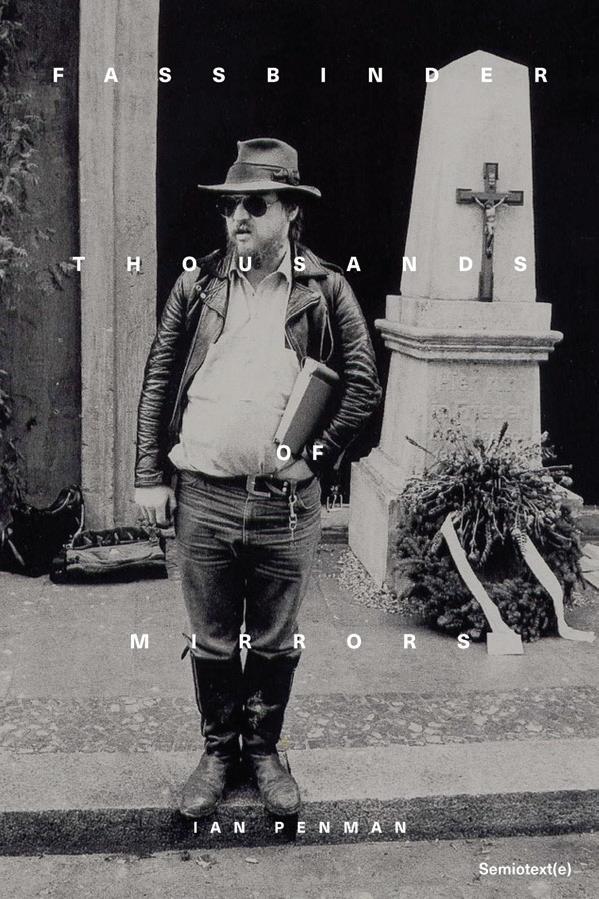
7 minute read
Semiotext(e
I Could Not Believe It
The 1979 Teenage Diaries of Sean DeLear Sean DeLear edited by Michael Bullock and Cesar Padilla introduction by Brontez Purnell
Advertisement
A remarkable time capsule of Simi Valley, 1979, written before the author would become one of LA’s most influential artists.
When Sean DeLear died prematurely in Vienna in 2017, his friends discovered—among other treasures— an extensive diary kept at the age of fourteen. Still living with his Christian parents in the notoriously racist Los Angeles suburb of Simi Valley, Sean wrote almost every day about crushes and hustling, waterbeds, blackmail, Donna Summer, gloryholes, racism, and shoplifting gay porn.
DeLear would go on to become the frontman for the Los Angeles punk/powerpop band Glue. He was a punk musician, visual artist, intercontinental scenester, video vixen, party host, marijuana farmer, and sometime-collaborator of artists such as Kembra Pfahler and Vaginal Davis.
DeLear’s forgotten diaries capture a moment in Los Angeles underground and queer history when, as his friend the writer Cesar Padilla notes, “It wasn’t cool at all to be trans, gay, queer or whatever. Those words weren’t even in the vocabulary.” I Could Not Believe It, Padilla continues, “is a raw fearless innocent gay Black kid’s journey coming out into life at an incredible pre-AIDS period. It’s not cognizant of being literature. It’s as naïve and forthcoming as it gets. It wasn’t written with the desire to be published so Sean didn’t hold back. Sean’s goal was to be true to himself.”
Sean DeLear (1965–2017) was an infl uential member of the “Silver Lake scene” of Los Angeles’s 1980s and 1990s before moving to Europe. In Vienna, he joined the art collective Gelitin and devised a solo cabaret show, Sean DeLear on the Rocks. DeLear was a cultural boundary breaker whose work transcended sexuality, race, age, genres, and scenes. As Lina Lecaro wrote in the LA Weekly, “Sean DeLear epitomized everything that ever made me want to write about Los Angeles nightlife . . . He was Los Angeles royalty.”
biography | autobiography | gay studies April | 5 1/2 x 8, 208 pp. | 2 illus.
US $16.95T/$22.95 CAN paper
978-1-63590-183-2 Native Agents series Distributed for Semiotext(e)
mitpress.mit.edu | Spring 2023 113

Fassbinder Thousands of Mirrors
Ian Penman
A kaleidoscopic study of Rainer Werner Fassbinder.
Melodrama, biography, cold war thriller, drug memoir, essay in fragments, and mystery, Thousands of Mirrors is cult critic Ian Penman’s long-awaited fi rst full-length book: a kaleidoscopic study of Rainer Werner Fassbinder. Written over a short period “in the spirit” of RWF, who would often get fi lms made in a matter of weeks or months, Thousands of Mirrors presents the fi lmmaker as Penman’s equivalent of what Baudelaire was to Benjamin: an urban poet in the turbulent, seeds-sown, messy era just before everything changed. Beautifully written and extraordinarily compelling, echoing the fragmentary works of Roland Barthes and Emil Cioran, Eduardo Galeano and Alexander Kluge, this story has everything: sex, drugs, art, the city, cinema, and revolution.
Ian Penman is a British writer, music journalist, and critic. He began his career at the NME in 1977, later contributing to various publications including The Face, Arena, Tatler, Uncut, Sight & Sound, The Wire, The Guardian, the London Review of Books, and City Journal. He is the author of Vital Signs: Music, Movies, and Other Manias and It Gets Me Home, This Curving Track.
film | biography April 5 1/2 x 8, 200 pp.
US $16.95T/$22.95 CAN paper
978-1-63590-188-7 for sale in North America only Native Agents series Distributed for Semiotext(e)
114 Spring 2023 | mitpress.mit.edu
Gary Indiana
introduction by Olivia Laing
A dark yet compassionate comedy of art aspirations and friendships come to naught.
First published in 2003, Gary Indiana’s turn-of-themillennium novel traces the lives of a loosely connected group of New York artists and the dissolution of their scene. During the summer of 2001, the narrator of Do Everything in the Dark, a gallery curator, receives intermittent dispatches from his far-fl ung friends—many of whom resemble well-known fi gures in the art and intellectual worlds—who are spread out across the globe, from Istanbul to Provincetown to Santa Fe. Seeking various reprieves from a changed New York, the long-festering, glossed-over incompatibilities of these aging bohemians blossom into exotic and unbearable relief. Beneath the contemporary excesses Indiana chronicles, we can see the outlines of the earlier New York bohemia captured by Dawn Powell.
Arguably Indiana’s most intimate, internal, and compassionate work to date, Do Everything in the Dark is a chilling chronicle of madness and failure, success and disappointment, and the many ways love dies in a world people fi nd increasingly unlivable.
Gary Indiana is an American writer, actor, artist, and cultural critic. Best known for his classic American true-crime trilogy registering the debased state of American life at the millennium’s end (Resentment, Three Month Fever: The Andrew Cunanan Story, and Depraved Indiff erence), Indiana has been described by The Guardian as “one of the most important chroniclers of the modern psyche.”
fiction May 5 1/2 x 8, 296 pp.
US $16.95T/$22.95 CAN paper
978-1-63590-186-3 Jack Skelley
afterword by Sabrina Tarasoff
The first complete edition of this notorious novel which maps the 1980s anarchic underground of Los Angeles.
Published in excerpts over almost four decades, Jack Skelley’s “secretly legendary” novel is at once an homage to the thrillingly inventive spirit of Kathy Acker’s cut-up novels and a defi nitive history of LA’s underground culture of the mid-1980s. Composed in bursts, Fear of Kathy Acker depicts Los Angeles through the eyes of a self-mocking narrator. Shifting styles and personae as he moves between Venice and Torrance, punk clubs and shopping malls, Disneyland and Dodger Stadium, Jack Skelley pushes the limits of language and identity while pursuing—like Kathy Acker—a quixotic literary mix of discipline and anarchy. In this adrenalized, cosmic, and comic chronicle of Los Angeles, Skelley’s “real life” friends make cameo appearances alongside pop archetypes from Madonna to Billy Idol.
This fi rst-ever complete edition of the book includes new essays, playlists, and a map of the 1980s Los Angeles in which its manic protagonist lives and loves.
Poet, journalist, and musician Jack Skelley is the author of Monsters, Dennis Wilson and Charlie Manson, and the forthcoming Interstellar Theme Park: New and Selected Writing. During the years when Fear of Kathy Acker was written, Skelley produced the music series and coproduced the reading and performance series at Beyond Baroque while editing and publishing Barney: The Modern Stone Age Magazine, featuring major artists and writers. He is a songwriter and guitarist for the psychedelic surf band Lawndale.
fiction May | 5 1/2 x 8, 128 pp. | 2 illus.
US $15.95T/$21.95 CAN paper
978-1-63590-185-6 Native Agents series Distributed for Semiotext(e)
mitpress.mit.edu | Spring 2023 115
Anonymous
translated by Robert Hurley
What if capitalism and its social machine were the outcome of a conspiratorial strategy?
What if capitalism and its social machine were the outcome of a conspiratorial strategy? This anonymous book considers evidence that they must be that. Further, it argues in favor of passionate counter-conspiracies as the logical form of revolt in our time, when our very souls are said to be at stake.
political science April | 4 1/2 x 7, 400 pp. | 30 illus.
US $16.95T/$22.95 CAN paper
978-1-63590-179-5 Intervention Series Distributed for Semiotext(e)
Minorities and Classes Maurizio Lazzarato
translated by Ames Hodges
An acute reappraisal for our time of the very concept of revolution.
In order to be eff ective, union struggles, struggles for national liberation, worker mutualism, or struggles for emancipation were strategies that were necessarily connected to revolution. Starting from the historic defeat of the global Revolution in the mid-1970s, this book draws a portrait—whose elaboration is still lacking—of the concept of revolution. What conditions could lead us to speak of revolution once again? In The Intolerable Present, the Urgency of Revolution, Maurizio Lazzarato ponders the fundamental importance of the passage from the historical class struggle (the confl ict between capital and labor) to the more recent class struggles that open onto plural trajectories: social, sexual, gender, and race struggles. Expanding the notion of class as a rejoinder to the normative appropriation of minority politics, the revolution is returned as the horizon where subjection can be resorbed.
In this sense, Marxist, feminist, anticolonial, and postcolonial theories provide the necessary critical tools to understand the relations between classes and minorities, between the global North and the global South, and between the time of revolutions and the eruption of new subjectivities.
Maurizio Lazzarato is an independent philosopher who lives and works in Paris. He is the author of Wars and Capital with Eric Alliez (Semiotext(e), 2018), and Capital Hates Everyone: Fascism or Revolution (Semiotext(e), 2021).
political science May | 4 1/2 x 7, 432 pp.
US $16.95T/$22.95 CAN paper
978-1-63590-181-8 Intervention Series Distributed for Semiotext(e)
116 Spring 2023 | mitpress.mit.edu








